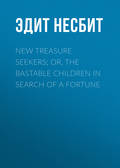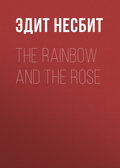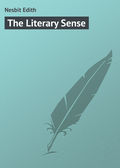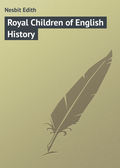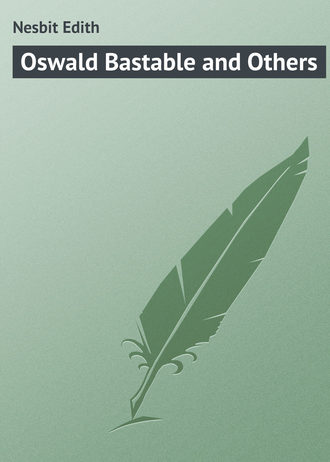
Эдит Несбит
Oswald Bastable and Others
THE WHITE HORSE
'Please, father,' Diggory said, 'I want to go out and seek my fortune.'
'Seek your grandmother,' said his father, but not unkindly. He was smoking a pipe outside his cottage door, and he had a red-spotted handkerchief over his head because of the flies. There were flies then, just the same as there are now, though it was a hundred years ago by the church clock.
'I wasn't thinking of my grandmother,' said Diggory; 'I was thinking of my Uncle Diggory. He was the third son of a woodcutter, just like I am, and he saw right enough that that's the sort that has to go out and seek its fortune. And I'm getting on, father; I shall be twenty before you know where you are.'
'You'll have to be twenty and more before I agree not to know where you are,' said his father. 'Your Uncle Diggory did well for himself, sure enough, and many a turkey and chine he's sent us at Christmas-time; but he started a-horseback, he did. He got the horse from his Uncle Diggory, and he was a rover too. Now, if you went, you'd have to go on Shank's mare, and them that go a-foot comes back a-foot.'
'Will you let me go, then, if I can get a horse?' said Diggory coaxingly. 'Do say yes, dad, and then I won't say another word about it till I've got the horse.'
'Drat the lad —yes, then!' shouted the father.
Diggory jumped up from the porch seat.
'Then farewell home and hey for the road,' cried he, 'for I've got the horse, dad. My Uncle Diggory sent it to me this very day, and it's tied up behind the lodge; white it is, and a red saddle and bridle fit for a King.'
The woodcutter grumbled, but he was a woodcutter of honour, and having said 'Yes,' he had to stick to yes.
So Diggory rode off on the white horse with the scarlet saddle, and all the village turned out to see him go. He had on his best white smock, and he had never felt so fine in all his days.
So he rode away. When he came to the round mound windmill he stopped, for there was Joyce taking in the clean clothes from the hedge, because it was Monday evening.
He told her where he was going.
'You might take me with you,' she said. 'I'm not so very heavy but what we could both ride on that great big horse of yours.' And she held up a face as sweet as a bunch of flowers.
But Diggory said, 'No, my dear. Why, you little silly, girls can't go to seek their fortunes. You'd only be in my way! Wish me luck, child.'
So he rode on, and she folded up the linen all crooked, and damped it down with her tears, so that it was quite ready for ironing.
Diggory rode on, and on, and on. He rode through dewy evening, and through the cool black night, and right into the fresh-scented pinky pearly dawning. And when it was real live wide-awake morning, Diggory felt very thin and empty inside his smock, and he remembered that he had had nothing to eat since dinner-time yesterday, and then it was pork and greens.
He rode on, and he rode on, and by-and-by he came to a red brick wall, very strong and stout, with big buttresses and a stone coping. His horse (whom he had christened Invicta, and perhaps if he had known as much Latin as you do he would have called him something different) was a very high horse indeed, and by standing up in his stirrups Diggory could see over the wall. And he saw that on the other side was an orchard full of trees full of apples, red, and yellow, and green. He reined Invicta in close under the wall and said, 'Woa, there! stand still, will 'e?' And he stood up on the broad saddle and made a jump and caught at the stone coping of the wall, and next moment he had hung by his hands and dropped into the orchard. And it was a very long drop indeed. For he had quite made up his mind to take some of the apples. First, because he was hungry, and, secondly, because boys will take apples – in stories that is, of course; really, they would never think of such a thing.
With a practised eye, Diggory chose the tree with the fattest, rosiest apples on it. He climbed the tree, and had just settled himself astride a convenient bough when he heard a voice say: 'Hi! You up there!'
And, looking down, he saw a flat-faced old man with a red flannel waistcoat standing under the tree looking up spitefully.
'Good-morning, my fine fellow,' said the old man. 'You seem a nice honest lad, and I'm sorry for your sake that apple stealing's punished so severely in these parts.'
'I've not had any apples yet,' said Diggory. 'Look here, I'll go away if you like, and we'll say no more about it.'
'That's a handsome offer, very,' said the nasty old man; 'but this is an enchanted orchard, and you can't go away without with your leave or by your leave, as you came in. Why, you can't even get out of the tree – and as for climbing the wall, no one can do it without a white horse to help him. So now where are you?'
Diggory knew very well where he was, and he tried at once to be somewhere else, but the old man was right. He could move all about the tree from branch to branch, but the tree felt wrong way up and he felt wrong way up; that is to say, he could not get to the ground except by jumping much harder than he knew how to, and then he knew he would only have fallen back again, just as you would fall back if you jumped up to the ceiling. He could have fallen off the tree the other way, of course, but then he would have fallen up into the sky, and there seemed to be nothing there to stop his falling for ever and ever. So he held tight and looked at the old man. And Diggory thought he looked nastier than ever.
So he said: 'Well?'
And the old man said: 'Not at all! However, since you had the sense not to fall off wrong way, I suppose you're the boy I want. Now, look here, you throw me down those ten big apples, one by one, so that I can catch them, and I'll let you go out by the Apple Door that no one but me has the key of.'
'Why don't you pick them yourself?' Diggory asked.
'I'm too old; you know very well that old men don't climb trees. Come, is it a bargain?'
'I don't know,' said the boy; 'there are lots of apples you can reach without climbing. Why do you want these so particularly?'
As he spoke, he picked one of the apples and threw it up and caught it. I say up, but it was down instead, because of the apple-tree being so very much enchanted.
'Oh, don't!' the old man squeaked like a rat in a trap – 'don't drop it! Throw it down to me, you nasty slack-baked, smock-frocked son of a speckled toad!'
Diggory's blood boiled at hearing his father called a toad.
'Take that!' cried he, aiming the apple at the old man's head.' I wish I could get out of this tree.'
The apple hit the old man's head and bounced on to the grass, and the moment that apple touched the ground Diggory found that he could get out of the tree if he liked, for he felt that he was now the proper way up once more, and so was the tree.
'So,' he said, 'these are wish-apples, are they?'
'No, no, no, no!' shrieked the old man so earnestly that Diggory knew he was lying. 'I've just disenchanted you, that's all. You see, most people fall up out of the tree and you didn't, so I thought I'd let you go, because I'm a nice kind old man, I am, and I wouldn't so much as hurt a fly. They aren't wish-apples, indeed they aren't.'
'Really,' said Diggory. 'I wish you'd speak the truth.'
With that he picked the second apple and threw it. And the old man began to speak the truth as hard as ever he could speak. It was like a child saying a lesson it has just learned, and is afraid of forgetting before it can get it said.
'I am a wicked magician. I have turned hundreds of people's heads in that tree so that they fall into the sky, and when they fall back again, as they have to do when the tide turns, I make them into apple-trees. I don't know why I do, but I like to. I suppose it's because I'm wicked. I never did anything useful with my magic, but I can hurt. And there's only one way out of this, and I don't mean to show it you.'
'It's a pity you're so wicked,' said Diggory. 'I wish you were good.'
He threw down another apple, and instantly the magician became so good that he could do nothing but sit down and cry to think how wicked he had been. He was now perfectly useless. But Diggory was no longer afraid of him, so he gathered the ten apples that were left and put them inside his shirt, and came down the tree.
The old man couldn't tell him how to get out, and he couldn't disenchant the fruit-trees or anything. So Diggory had to spend three wish-apples. First he spent one on making the old man happy. This was done as it is in Miss Edgeworth's stories – by giving him a thatched cottage and a garden, and a devoted grand-daughter to look after him. The next apple showed Diggory the Apple Door, which he had not been able to find, and he went out by it. You, of course, can find it on the map, but he had no map, and, besides, it is spelt differently. Before he went out of the orchard he threw down another apple, and wished the apple-trees to be disenchanted. And they were. And then the red-walled orchard was full of Kings and Princesses, and swineherds and goosegirls, and statesmen and stevedores, and every kind of person you can or can't think of.
Diggory left them to find their own ways home – some of them lived ever so long before, and ever so far away – and he himself went out by the Apple Door, and found his good white horse, who had been eating grass very happily all the time he had been in the company of the magician, and that had been two days and a night.
So Invicta was not hungry, but Diggory was; and, in fact, he was so hungry that he had to use a wish-apple to get his supper, and that was very, very wasteful of him, and he often regretted it in after years. It is true that he wished for the best supper in the world, and had it; but it was only bread-and-milk! If he had wished for the nicest supper it would have been different, no doubt.
Diggory rode on anxiously, arranging what wishes he should have with the rest of the apples, but in the dusk he missed his way and was nearly drowned in a rain-flooded ford, and poor white Invicta was quite carried away.
Then Diggory took off his shirt to wring the water out, and as he took it off he said: 'I wish I had my good white horse again.'
And as he said it all the apples but one tumbled out of his shirt on to the ground, and he heard soft neighings and stampings and hustlings and rustlings all round him in the dark, and when the moon rose he saw that he had had his wish – he had his good white horse back again. But as he had dropped eight apples, he had his good white horse back eight times, and as eight times one is eight, he had now eight good white horses, all called Invicta.
'Well, eight horses are better than nothing!' he said; and when he had tethered the horses he went to sleep, for he felt strangely feeble and tired.
In the morning he woke with pains in every limb. He thought it was a cold from the wetting in the ford, but it was really rheumatism. And he could not get rid of it. He tied seven horses together and led them, riding on the eighth.
'Eight horses are a pretty good fortune for a woodcutter's son,' he said to himself, 'and, anyway, I'm too tired to go looking for any better one.'
So he rode home.
He knew the roads well enough, and yet they seemed different; they were much better roads to ride over, for one thing, and the hedges and trees were odd somehow. And the big wood near his father's house seemed very small as he looked down on it from the hill. But when he got to the village he thought he must have gone mad, for in the day and two nights and a day that he had been away the village had grown big and ugly and yellow-bricky, and there were eight shops and six public-houses besides the Bill and Billet, and many more people than there used to be, all in ugly, untidy clothes, and the Round Mound windmill was gone! The people came crowding round him.
'What's become of the mill?' he asked, trembling all over.
The boys and girls and men and women stared, and a very old man stepped out of the crowd.
'It were pulled down,' he said, 'when I were a boy.'
'And the woodcutter's cottage?'
'That were burnt down a matter of fifty year ago. Was you a native of these parts, old man?'
There was a large plate-glass shop-window just opposite the crowd that surrounded Diggory. A dark blind was pulled down inside, because it was Wednesday and early-closing day. This made a fine mirror, and Diggory happened to look in it, and there he saw himself – an old, old white-haired man on a white horse. He had a white beard, too, but it was quite short, because it had only had since bedtime last night to grow in.
He almost tumbled off his horse. The landlord of the Ship led him in to sit by the fire in the bar parlour, and the eight horses were put up in the stable.
The old man who had told him about the mill came and sat by him, and poor old Diggory asked questions till he grew tired of hearing the answer, which was always the same: 'Dead, dead, dead!'
Then he sat silent, and the people in the bar talked about his horses, and a young man said:
'I wish I'd got e'er a one on 'em. I'd do a tidy bit in fish, an' set up for myself – so I would.'
'Young man,' said Diggory, 'you may take one of them; its name is Invicta.'
The young man could hardly believe his fortunate ears. Diggory felt his heart warm to think that he had made someone else so happy. He felt actually younger. And next morning he made up his mind to give away all the horses but one. That one he would sell, and its price would keep him for the rest of his life: he hoped that would not be long, for he did not care to go on living now that he had seen the tombstones in the churchyard with the names of his father and brothers and little Joyce of the mill.
He led his horses away next day. He did not want to give them all away in one village, because that would have lessened the value of his gift to the young man who was going into fish, and, besides, it would have been awkward to have so many horses of the same name in one village.
He gave away a horse at each village he passed through, and with every horse he gave away he felt happier and lighter. And when he had given away the fourth his rheumatism went, and when he had given away the seventh his beard was gone.
'Now,' he said to himself, 'I will ride home and end my days in my own village, and be buried with my own people.'
So he turned his horse's head towards home, and he felt so gay and light-limbed he could hardly believe that he was really an old, old man. And he rode on.
And at the end of the village he stopped and rubbed his eyes, for there stood the Round Mound windmill, and on the slope was Joyce, looking prettier than ever in a russet petticoat and a white neckerchief and a pink print gown with little red rosebuds on it.
'Oh, Diggory, Diggory,' she cried, 'you've come back, then! You'll take me with you now, won't you?'
'Have you got a looking-glass, my dear?' said he. 'Then run in and fetch it.'
She ran. He took it and looked in it. And he saw the same young brown face and the same bright brown hair that he had always known for him, and he was not old any more. And there was Joyce holding up a face as sweet as a bunch of flowers.
'Will you take me?' said she.
He stooped down and kissed the face that was so sweet.
'I'll take you,' said he.
And as they went along to his home he told her all the story.
'Well, but,' she said, 'you've got one wish-apple left.'
'Why, so I have,' said he; 'if I hadn't forgotten it!'
'We'll make that into the fortune you went out to find. Do, do let me look at it!'
He pulled out the apple, and she took it in her hand as she sat behind him on the big white horse.
'Yes, our fortune's made,' he said; 'but I do wish I knew why I turned old like that.'
Just then Invicta stumbled, and Joyce caught at her lover to save herself from falling, and as she caught at him the apple slipped from her hand and the last wish was granted. For as it bounced on the road Diggory did know why he had grown old like that. He knew that the magician had arranged long before that every wish-apple that was used outside the orchard should add ten years to the wisher's age. So that the eight horses had made him a hundred years old, and the spell could only be undone by the wisher's giving away what he'd wished for. So that it was Diggory's generosity in giving away the horses that had taken him back to the proper age for being happy in. I don't want to be moral, and I'm very sorry – but it really was that.
He carried Joyce home to his father's house. They were much too pleased with each other to bother about the wasted wish-apples.
'You're soon back, my son,' said the woodcutter, laughing.
'Yes,' said Diggory.
'Have you found your fortune?'
'Yes,' said Diggory; 'here she is!'
And he presented Joyce. The woodcutter laughed more than ever, for the miller's daughter was a bit of an heiress.
'Well, well!' he said.
So they were married, and they had a little farm, and the white horse was put to the plough, and to the cart, and the harrow, and the waggon; and he worked hard, and they worked hard, so that they all throve and were very happy as long as ever they lived.
Said Joyce one day to Diggory, 'How was it you wanted to take me with you directly you came back, and when you were going away you didn't.'
'I've often wondered about that myself,' he said; 'I think it must have been the bread-and-milk. You see, it was one of the wish-apple things, just like the horses were, only they were outside things, so they made me old outside; but the bread-and milk – '
'Was an inside thing, of course – quite inside.'
'Yes, so it made me old inside of my mind, just old enough to have the sense to see that you were all the fortune I wanted, and more than I deserved.'
'I didn't have to be so very old to know what fortune I wanted,' said Joyce, 'but, then, I was a girl. Boys are always much stupider than girls, aren't they?'
The only person in this story you are likely to have heard of is, of course, Invicta, and he is better known as the White Horse of Kent.
You can see pictures of him all over his county: on brewers circulars and all sorts of documents, and carved in stone on buildings, and even on the disagreeable, insulting fronts of traction-engines. Traction-engines pretend to despise horses, but they carry the image of the White Horse on their hearts. And his name is generally put underneath his picture, so that there shall be no mistake.
SIR CHRISTOPHER COCKLESHELL
The children called him Sir Christopher Cockleshell. – 'Sir,' in token of respect for his gray hairs and noble-looking face; Christopher, because he had once carried Mabel across the road on a very muddy day, when thunder showers and the parish water-carts had both been particularly busy; and Cockleshell, because of the house he lived in.
It was a most wonderful house – like the gateway of an old castle. It had a big arch in the middle and a window over the arch, and there were windows, too, in the towers on each side of the arch. All along the top were in-and-out battlements. It had been covered with white plaster once, but flakes of this had fallen away and showed the pinky bricks underneath. But the oddest thing about the house was the trimming that ran all round the bottom story about the height of a tall man. This trimming was of oyster-shells, and cockle-shells, and mussel-shells, and whelk-shells, and scallop-shells, all stuck on the wall of the house in patterns. It was a very wonderful house indeed, and the children always tried to go past it on their way to everywhere.
The children themselves lived in a large, square, ordinary brown-brick house among other ordinary brown-brick houses. Their house had a long garden with tall old trees in it, and so had the other houses. Looking out of the boxroom window was like looking down on the top of a green forest, Phyllis always thought. Only now, of course, the trees were not green any more, because it was nearly Christmas.
'I wish Sir Christopher had a garden to his house,' Phyllis said one day to the new housemaid.
'There used to be a pleasure-gardens there, I've heard father tell,' said the new housemaid. 'Quite a big gardens, it was. The gent as owned it was as rich as rich, kep' his carriage and butlers and all. But when his son come into the property he sold the gardens for building on, and only kep' the gate-house – the Grotto they calls it. An' there 'e's lived ever since in quite a poor way. Nasty old miser, that's what he is!'
'He may be a miser,' said Phyllis, 'but he's not nasty. He carried Mabel as kind as could be.'
'Have you ever spoke to him since?' demanded the housemaid.
'No,' said Phyllis; 'he always smiles at us, but he's always in a hurry.'
'That's it,' said the housemaid; ''e's afraid to let anyone inside of his house, fear they should get to see all the sacks of money he's got there. And he pokes about and picks things outer the gutters, so he won't get to know anyone. My young brother he knocked at the door once to arst for a drink of water – thought he'd get a squint at the inside of the house while the old chap was gone to draw it. But he shuts the door in Elf's face, and only opens it a crack to hand him the mug through.'
'It was kind of him to give your brother the water,' said Phyllis.
'Elf didun want the water,' said Alf's sister; ''e'd just 'ad a lemonade at the paper shop.'
Phyllis had often wanted to do something kind for Sir Christopher, but she could not think of anything that wasn't just as likely to annoy him as to please him. If she had known when his birthday was, she would have put a birthday card under his door; but no one can be pleased at having a card with 'Bright be thy natal morn' on it when really the natal morn is quite a different date. She would have taken him flowers at the time when dahlias and sunflowers grew at the end of the garden, but perhaps he would not like the bother of putting them in water; and, if he was really poor, and not a miser, as Jane said, he might not have a vase or jug to put them in.
And now it was Christmas-time. Guy was home for the holidays, and that was splendid. But, on the other hand, mother and father had had to go to granny, who was ill. So there would be no real Christmas in the brown house.
'But I'll tell you what,' said Phyllis; 'there's the Christmas-tree for the poor children at the schools. Suppose we were to make some things for that, and buy some, and go down and help decorate? Mother said we might.'
Guy was rather clever with his fingers, and as we all like doing what we can do really well, he did not make such a fuss over making things as some boys do. He could make doll's furniture out of pins and wool, and armchairs out of the breast-bones of geese; only there are so seldom enough breast-bones of geese to make a complete set of furniture.
There was nearly a week to make things in, and long before its end the schoolroom began to look like a bazaar. There were little boxes of sweets covered with silver paper, and scrapbooks made of postcards covered with red calico, and some little dolls that the girls dressed, as well as all the things that Guy made.
'How ravishingly beautiful!' said Mabel, when the shiny, shimmery, real Christmas-tree things bought at the shop were spread out with the others.
The day before Christmas Eve the children were very happy indeed, although they had had to be made thoroughly tidy before Jane would allow them to go down to the school; and being thoroughly tidy, as you know, often means a lot of soap in your eyes, and having your nails cleaned by someone who does not know as well as you do where the nail leaves off and the real you begins.
They went to the side-door of the school, and left the baskets and bundles of pretty things in the porch and went in.
The big tree was there, but it was just plain fir-tree so far, nothing Christmassy about it, except that it was planted in a tub.
'How do you do?' said Guy politely to the stout lady in a bonnet with black beads and a violet feather; 'I'm so glad we're in time.'
'What for?' said the stout lady. 'The tree's not till to-morrow. Run away, little boy.'
'Oh, Mrs. Philkins,' said Phyllis, 'he's not a little boy, he's Guy; don't you remember him?'
'I remember him in petticoats,' said Mrs. Philkins: 'he's grown. Good-afternoon.'
'Mother said,' said Guy, keeping his temper beautifully, 'that we might come and help.'
'Very kind of your mother to arrange it like that. But I happen to be in charge of the tree, and I don't want any outside assistance.'
The children turned away without a word. When they got outside Guy said:
'I hate Mrs. Philkins!'
'We oughtn't to hate anybody,' said Mabel.
'She isn't anybody – at least, not anybody in particular,' said Phyllis; 'I heard father say so.'
'She wouldn't have been such a pig to us if she'd known what we'd brought for the tree,' said Phyllis.
'I'm glad she didn't know. I wish we hadn't done the things at all,' said Guy; 'it's always the way if you try to do good to others.'
'It isn't,' said the others indignantly; 'you know it isn't.'
'That's right!' said Guy aggravatingly, 'let's begin to quarrel about it —us– that would just please her. Let's drop the whole lot into the canal, and say no more about it.'
'Oh no!' cried both the girls together, clutching the precious parcels they carried.
'But what's the good?' said Guy; 'we don't know anyone who's got a Christmas-tree to give them to.'
Phyllis stopped short on the pavement, struck motionless by an idea.
'I know,' she said: 'we'll have a tree of our very own.'
'What's the good if there's no one to see it?'
'We'll ask someone to see it.'
'Who?'
'Sir Christopher!'
The daring and romance of this idea charmed even Guy. But he thought it would be better not to ask Sir Christopher to come to their house: 'Servants are so odd,' he said; 'they might be rude to him, or something. No; we'll get it ready, and we'll wheel it round after dark, and ask him to let us light it in his yard. Then he won't think we're trying to pry into his house.'
Half an hour later Guy staggered in, bearing a fir-tree.
'Only ninepence,' he said; 'it's a bit lop-sided, but we can tie ivy on or something to make that right. I'm glad that old cat wouldn't let us help. It's much jollier like this.'
The tree was planted in a pot that a dead azalea had lived in; and Mrs. Philkins was quite forgotten in the joy of trimming their own tree. Besides the things they had made there were the lovely things they had bought – stars and flags, and a sugar bird-cage with a yellow bird in it, and a glass boat with glass sails, and a blue china bird with a tail of spun glass.
Guy went out and borrowed a wheelbarrow from the gardener who cut their grass when it was cut, and when the tree was trimmed he and Phyllis carried it downstairs. The top branch with the star on it got banged against the banisters, and the side branch got into Guy's eye, and Phyllis's thumb got jammed between the pot and the banister rail. But what are trifles like these in an adventure like this?
They got the tree out of the front-door without being seen by the servants – a real triumph. They stood the pot in the barrow, and started to wheel it out of the front-gate. But directly they lifted the handles of the barrow the floor of it naturally ceased to be straight, and the flower-pot toppled over and cracked itself slightly against the side of the barrow, while the boughs of the tree, with their gay decorations, took the opportunity to entangle themselves in the bad-tempered leaves of the holly that stood there, and were disengaged with difficulty.
Then the pot refused to stand up, and at last it had to be laid down in the barrow, with its shiny treasures dangling over the front-wheel.
Then, the barrow was extremely heavy even without the tree in it; and the children did not go the nearest way to the Grotto, because they did not want to meet people, so they were thoroughly tired and extremely hot by the time they approached Sir Christopher Cockleshell's castle.
There was a bit of waste land close to it, where someone had once begun to build a house and had then thought better of it. A bit of this house's wall was standing on each side of the space where its front-door would have been if it had ever come to the point of having one. They wheeled the barrow in, and the light of a street lamp that obligingly shone through the door-space made it possible for them to disentangle the little strings that had got twisted round each other, to disengage the gilt fish from the sugar bird-cage, and to take the glass bird out of the goose-bone armchair in which it was trying to sit. Also they set up all the candles – six dozen of them. This is done with tin-tacks, as no doubt you know.
'Now,' said Guy, 'one of us must go and ask if he'll let us light it in his yard, and one of us must wait here with the tree.'
'What about me?' said Mabel.
'You can do which you like,' said Guy.
'I want to do both,' said Mabel; 'I want to stay with the pretty tree, and I want to go and ask him if he wants us.'
Mabel was still too small to understand thoroughly how hard it is, even for a grown-up person, to be in two places at once.
It ended in Guy's staying with the tree.
'In case of attacks by boys,' he said.
'Then I shall go with Phyllis,' said Mabel.
Both girls felt their hearts go quite pitter-pattery when at last they stood on the doorstep of the castle.
'Why don't you knock?' Mabel asked.
'I don't like to,' said Phyllis.
Mabel instantly knocked very loudly with a wooden ninepin-ball that she happened to have in her pocket.
'Oh, I wish you hadn't!' said Phyllis; 'I wanted to think what to say first, and now there's no time.'
There certainly was not. The door opened a cautious inch, and a voice said:
'Who's there?'
'It's us,' said Phyllis, 'please. We don't want to pry into your beautiful house like Jane's brother Alf when he asked you for the drink of water, only we've made up a Christmas-tree, and may we stand it in your yard and light it – the candles, I mean?'




